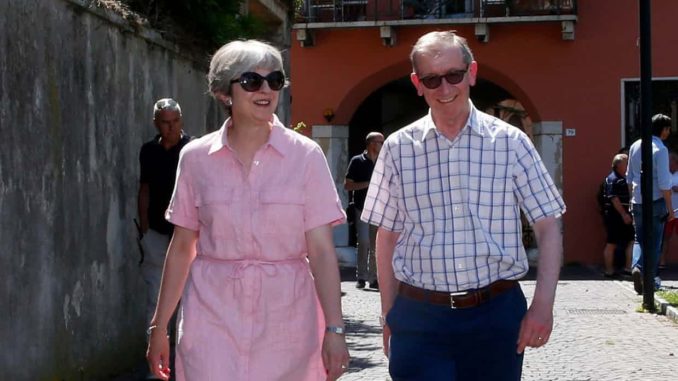
t is impossible to escape reminders of the consequences of a divided Europe at the moment. Christopher Nolan’s epic account of the Dunkirk retreat has become this summer’s box office blockbuster. On Sunday European dignitaries and members of the Belgian and British royal families gathered in the Belgian frontline town of Mons to commemorate the 100th anniversary of the beginning of the mud-soaked tragedy of Passchendaele. On 31 July 1917 the first shots were fired in the three-and-a-half-month battle in which the number of casualties will never be known but can be estimated at more than half a million dead and wounded on both sides.
The occasion brought the prime minister, Theresa May, back to work for the weekend, breaking her three weeks in the Swiss mountains. She may be on holiday, but according to Downing Street she is still in charge. Unusually, no official deputy has been named. That makes the past week of conflicting accounts of the government’s intentions for Brexit all the harder to comprehend. To most observers (including some former Tory MPs, such as the Times columnist Matthew Parris, who wrote on Saturday that the chaos made him ashamed to be a Tory), it is both terrifying and appalling that more than a year after the referendum, Mrs May presides over a cabinet that is still arguing about what Brexit should look like.
The chancellor, Philip Hammond, who has always believed that the best outcome for jobs and business is the softest of Brexits, suggested in interviews last week that there was agreement in cabinet that after departure from the EU in 2019 there should be a further three years of transition when there would be little visible difference between being in and being out. Taking full advantage of what was the one advantage Mrs May secured with her early election, this transition could last until the next general election. Under the Fixed-term Parliaments Act, that is not until June 2022.
Some leading pro-Brexit commentators are beginning to suspect that there is a plot to put Brexit off for so long that it never actually happens. At first, however, Mr Hammond’s assertion went unchallenged. One of the leading pro-Brexit ministers, Michael Gove, now the environment secretary, had already used his first major speech in his new job to acknowledge the importance of a period of transition, and – rightly but unexpectedly – of EU labour to the agricultural sector. He even suggested that the UK would not sign up to any US trade deal that compromised British animal welfare standards.
The home secretary, Amber Rudd, seemed to reinforce the consensus on an extended schedule by commissioning a study of the economy’s need for migrant workers from the Migration Advisory Committee, which will not report back until September next year. The silence of the foreign secretary, Boris Johnson, flying the flag in Australia, appeared to indicate consent.
Then in interviews and articles in Brexit-supporting newspapers over the weekend the fault lines in the consensus showed themselves: Liam Fox made it clear he was not signed up to an extended transition period and still insists that free movement must end at the moment of departure in March 2019. The economist Gerard Lyons, one of Mr Johnson’s close allies, wrote arguing that talk of a cliff edge was like the needless panic over the millennium bug.
It may feel like progress that on the face of it the dispute has been narrowed down to whether the transition should take two years or three; but in truth it is still much more fundamental. With formal political business on hold until September, when the cabinet committee meets again and Mrs May is expected to make a major speech on the second reading of the bill that will repatriate thousands of laws from Brussels, businesses and voters have at least another month’s uncertainty about the government’s intentions.
Despite the new openness to the concerns of employers that has followed from June’s shattering election results, Downing Street’s focus still appears to be on finding, whatever the consequences, a Brexit bonus so big that the 52% who voted leave will be unable to miss it by the time of the next election. Mrs May wants to bank the extended timetable that is the result of the premature election without recognising the implications of her failure even to hold her majority; she has no majority to bulldoze her way out of the EU.
END

Be the first to comment